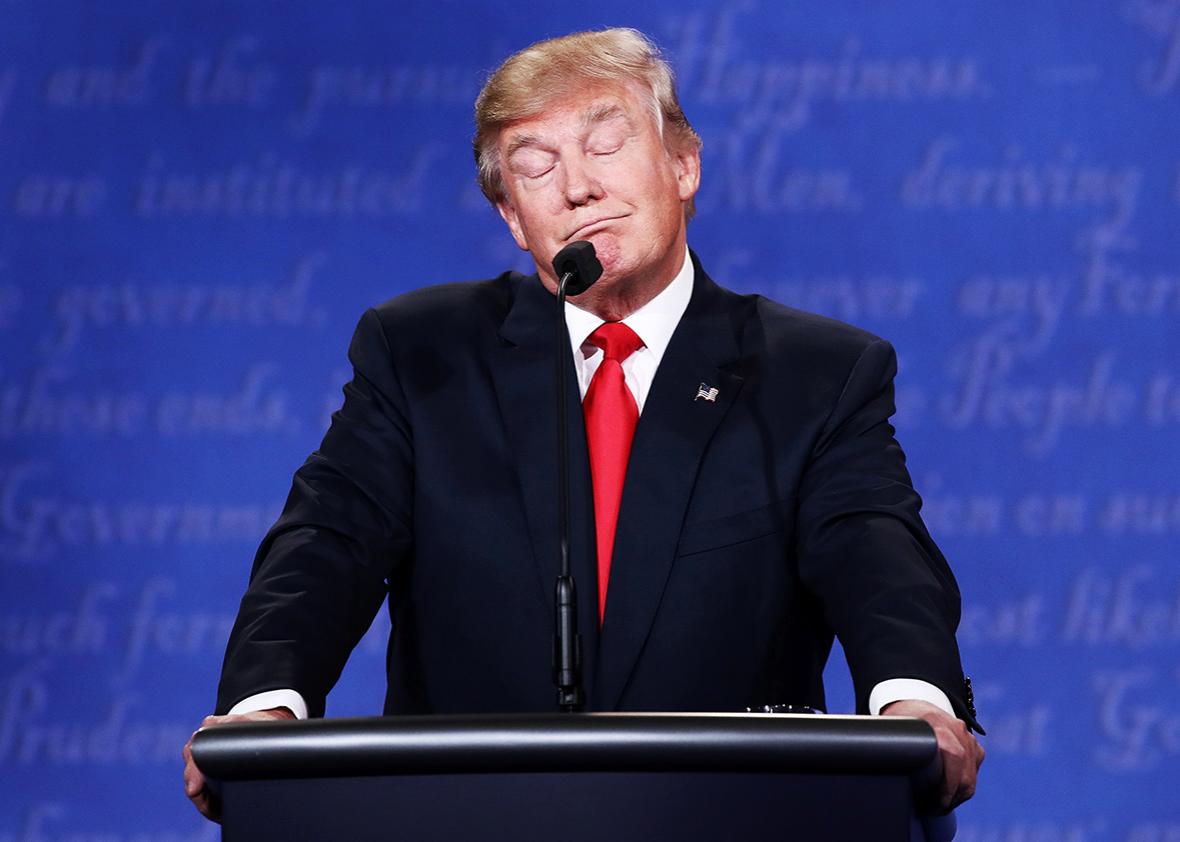“The essential characteristic of fascist propaganda was never its lies, for this is something more or less common to propaganda everywhere and of every time,” wrote the late political theorist Hannah Arendt in her 1945 essay “The Seeds of a Fascist International.” “The essential thing was that they exploited the age-old Occidental prejudice which confuses reality with truth, and made that ‘true’ which until then could only be stated as a lie.”
Put in plain language, fascists didn’t lie to obscure the truth; they lied to signal what would eventually become truth. Or to use Arendt’s analogy, “It is as though one were to debate with a potential murderer as to whether his future victim were dead or alive, completely forgetting that man can kill and that the murderer, by killing the person in question, could promptly provide proof of the correctness of this statement.”
Americans aren’t living under a fascist government, but they have elected a president with an unusual relationship to the truth. Even when they lie, most politicians care about the truth. It’s why they lie, why they try not to get caught. But Donald Trump doesn’t appear to see a difference between truth and lies. He lies as a matter of habit about matters large and small. His lies are often obvious: easily disproved by available information. For a strong example, look to Twitter. “In addition to winning the Electoral College in a landslide, I won the popular vote if you deduct the millions of people who voted illegally,” tweeted the president-elect on Monday. This charge is groundless. False. Frankfurt-ian bullshit. There is no evidence of “illegal voting,” no evidence of the mass fraud necessary to give Hillary Clinton a significant lead in the national popular vote.
But, following Arendt, debunking Trump’s lie as a lie misses the point of his lying. Since 2013, when the Supreme Court struck key provisions from the Voting Rights Act, GOP lawmakers in states across the country have pushed and pursued strict laws for voter identification and voter suppression. Republicans in Kansas, North Carolina, Ohio, Texas, and Wisconsin (among others) have tried to burden voters with cumbersome requirements, convoluted procedures, closed precincts, and reduced time for voting. In each case, Republicans began their push with broad accusations of voter fraud influenced by figures like conservative activist Hans von Spakovsky, a key architect of ID laws and other methods of voter suppression. “We call this restoring confidence in government,” said Thom Tillis, then-speaker of the North Carolina House of Representatives, in support of a strict voter ID law. “There is some evidence of voter fraud, but that’s not the primary reason or doing this. There are a lot of people who are just concerned with the potential risk of fraud.”
As president, Trump will have the power to take harsh action on voting rights and access. His Department of Justice, for example, could decline enforcement of much of the Voting Rights Act, freeing Republican-led states to enact strict and restrictive voting laws. Under Alabama Sen. Jeff Sessions, Trump’s pick for attorney general and a longtime opponent of broad and inclusive voting rights, that outcome looks likely. Trump could follow inaction with efforts to combat alleged voter fraud through investigation into voting rights and voter registration groups, and coordination of voter purges (trimming the rolls of registered voters). Trump’s top candidate for the Department of Homeland Security, Kris Kobach, has proposed as much, adapting his draconian policies as Kansas secretary of state for the nation at large.
Other voting skeptics in the Trump administration include chief adviser Stephen Bannon, who according to the New York Times, once questioned the value of universal suffrage, suggesting that only “property owners should be allowed to vote.” When told that this would exclude many black Americans, Bannon allegedly said, “Maybe that’s not such a bad thing.”
When Trump decries imaginary fraud in the presidential election, is he lying for its own sake? Is he lying to assuage his ego after losing the popular vote (in an election that he nonetheless won)? Or is he lying to clear the path for a federal assault on voting rights? Is he sowing the ground for a time when that lie—our elections are “rigged”—is the reality?
It is important to combat Trump’s lies with the truth: to dispute, debunk, and show the public the facts of the matter. At the same time, we should also stay attuned to the aims of Trump’s dishonesty, whether he’s obscuring a larger scandal—the president-elect’s “illegal voting” tweet came as the New York Times published a massive story on his influence-peddling and his disturbing quantity of conflicts of interest around the globe—or signaling priorities for his followers and surrogates. To that point, Trump’s tweet Tuesday morning isn’t a lie, but it fits the dynamic at hand. “Nobody should be allowed to burn the American flag—if they do, there must be consequences—perhaps loss of citizenship or year in jail!” wrote the president-elect on Twitter.
To revoke citizenship for burning the flag—that is, for dissent—is to violate the Constitution and stomp on the principles of this country. Pundits and observers will parse this message for meaning. Does it reflect Trump’s impulsive mind? Is it some tactical distraction? Does it reveal priorities?
Whatever the answer, whatever the fruits of this Trump-inflected Kremlinology, just remember Arendt’s warning: These lies and fantasies can become reality, if we are not vigilant.
